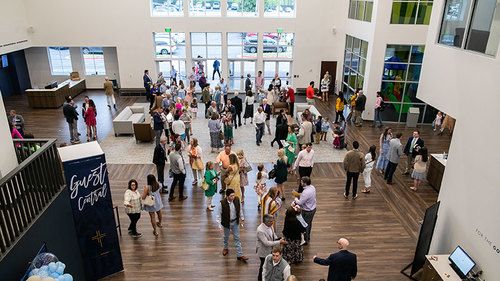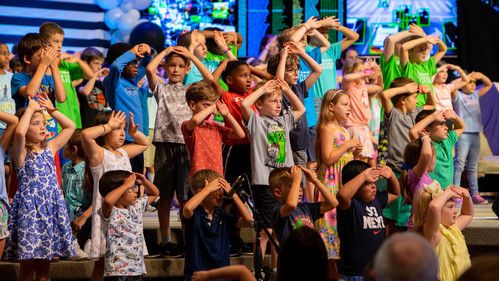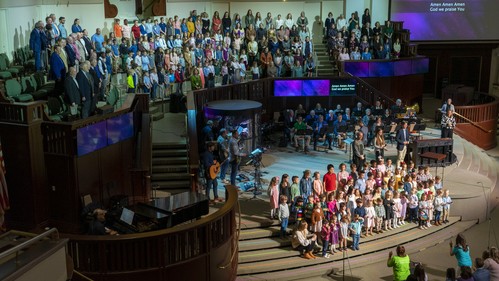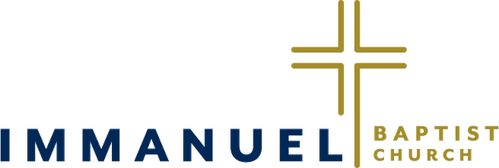Who we are
Kingdom Advancing Gospel Church
Interested in connecting with Immanuel, click here!



OUr Mission
At Immanuel, God is calling us to create a Kingdom Advancing Gospel culture. We want to see lives transformed by the Gospel of Jesus Christ. From this culture comes four priorities we hold as a church. We want our worship gatherings to be presence centered. As we proclaim God's Word, sing God's Word, and pray God's word his presence among us is our aim. Our groups are Word driven. Our D-Groups take the Word of God further into deep discipleship. As a result, we want to see God move this culture forward in joyful evangelism as we go into our communities and serve our neighbors.
OUr Vision
for the gospel. For the city. for the world.
To be for the Gospel is to understand that we have one message of hope for the world and that hope is found in Jesus. This message is revealed in the perfect word of God. The word is the means by which we know Jesus, and Jesus is the means by which we know God the Father. We are not presenting a message, but re-presenting what God has said in His perfect word.
To be for the city means that we care for Little Rock. We want our city to thrive in every possible way, knowing that the greatest gift we can give to this city is a strong local church- a church that knows this city and is fighting for her welfare.
To be for the world means we are seeking Kingdom Advance around the world. This means through our partnerships with other churches and our partnership with church planting movements, we are seeking to take the Gospel to dark places and hard places.
our history
Immanuel Baptist Church has a long and rich history of serving our community and proclaiming the name of Jesus. When founded in 1892, Immanuel was named Third Baptist Church, but on October 16 of the same year, the members agreed to change the name to Immanuel Baptist Church, signifying “God with us.”
Immanuel began with only 17 charter members in a small church on Jones Street. Over the years, Immanuel flourished at the 10th and Bishop location in downtown Little Rock. In 2003, Immanuel relocated to our present location on Shackleford Road.
In the 1930s, 40’s, and 50’s, Immanuel helped start several churches in Central Arkansas. While Immanuel has always supported missions and missional causes, in 1998, Immanuel hired our first missions pastor. Over time, this strategic move led to establishing church planting and mission partnerships across North America and the world, while maintaining continued support for the Southern Baptist Convention Cooperative Program. In 2020, Immanuel opened the City Center as a ministry hub to our community. The City Center hosts a dental clinic, an adult education center, a clothing closet, and a food ministry.
We are praying for a next generation to be for the Gospel, for the City, and for the World!
Immanuel began with only 17 charter members in a small church on Jones Street. Over the years, Immanuel flourished at the 10th and Bishop location in downtown Little Rock. In 2003, Immanuel relocated to our present location on Shackleford Road.
In the 1930s, 40’s, and 50’s, Immanuel helped start several churches in Central Arkansas. While Immanuel has always supported missions and missional causes, in 1998, Immanuel hired our first missions pastor. Over time, this strategic move led to establishing church planting and mission partnerships across North America and the world, while maintaining continued support for the Southern Baptist Convention Cooperative Program. In 2020, Immanuel opened the City Center as a ministry hub to our community. The City Center hosts a dental clinic, an adult education center, a clothing closet, and a food ministry.
We are praying for a next generation to be for the Gospel, for the City, and for the World!
FAQs regarding church structure.
What is the church structure?
Immanuel has a congregational polity, which essentially means its members hold the final
authority when voting at bimonthly Church Family Business Meetings on various church
matters. Examples include approving members of church committees, the calling of pastors,
the annual budget, etc. As a general rule, the church will be pastor-led, deacon-served,
committee-operated, & congregationally-affirmed. More information on Immanuel’s church
structure can be found in the Church Bylaws (Articles 1 and 2).
What is the role of Church Committees?
Immanuel is served by numerous Church Committees, each of which addresses a specific
operating function, ministry, or special purpose of the church. For example, the Finance
Committee works with staff to form an annual budget and meets regularly to review the
church’s finances. The Personnel Committee helps maintain personnel policies and find new
staff members when the need arises. The Nominating Committee uses nominations from the
church to fill vacancies on Church Committees, all of which are approved by the church.
More information on committees can be found in the Church Bylaws (Articles 8 and 9).
What is the role of Church staff?
Immanuel has a variety of staff members devoted to conducting its operation and ministries.
The four main categories of church staff are pastors, ministers, department heads, & staff
employees. Since Christ is the Chief Shepherd and Head of the Church, Immanuel sees its
Senior Pastor as Christ’s Undershepherd, expected to faithfully lead the staff and the church
in serving the Kingdom of God. More information on Church Staff can be found in the
Church Bylaws (Articles 5 and 6).
What is the role of deacons?
Deacons are ordained lay ministers whose primary purpose is to serve the Church in order to
“maintain the unity of the Spirit in the bond of peace” in the Church so that the “word of
God” may be advanced (Eph. 4:1-16, Acts 6:1-7). Our deacons serve in many practical ways
including the distribution of the Lord’s Supper, visiting hospitals, and ministering to the
widows of the church. At various times, the deacons request nominations from the church.
From these nominations, candidates are asked to complete a questionnaire that assess their
biblical qualifications, as expressed in 1 Tim. 3:8-13. The Deacon Body then recommends
new deacons to be approved and ordained by the Church for Kingdom service. More
information on deacons can be found in the Church Bylaws (Article 7).
What is the role of Trustees?
Trustees represent the church in signing loans, deeds, and other legal documents. The six
elected men and women typically have experience in law, banking, accounting, real estate,
or significant business management, as those skills are useful in performing the function of
a trustee. They are elected by the church for three-year terms and are eligible for successive
terms. More information on trustees can be found in the Church Bylaws (Article 10).
Other questions…
The best place to find information regarding our church’s governance structure is within the
IBCLR Bylaws located at ibclr.org/bylaws. Also found on the Bylaws webpage is a link to
the Baptist Faith and Message, a statement of faith affirmed by many other Southern Baptist
Churches like Immanuel. See BF&M Article VI for specific information on “The Church.”
If you have further questions, feel free to email info@ibclr.org. We would love to provide
clarity regarding the structure, governance, and details of how our church operates.
Immanuel has a congregational polity, which essentially means its members hold the final
authority when voting at bimonthly Church Family Business Meetings on various church
matters. Examples include approving members of church committees, the calling of pastors,
the annual budget, etc. As a general rule, the church will be pastor-led, deacon-served,
committee-operated, & congregationally-affirmed. More information on Immanuel’s church
structure can be found in the Church Bylaws (Articles 1 and 2).
What is the role of Church Committees?
Immanuel is served by numerous Church Committees, each of which addresses a specific
operating function, ministry, or special purpose of the church. For example, the Finance
Committee works with staff to form an annual budget and meets regularly to review the
church’s finances. The Personnel Committee helps maintain personnel policies and find new
staff members when the need arises. The Nominating Committee uses nominations from the
church to fill vacancies on Church Committees, all of which are approved by the church.
More information on committees can be found in the Church Bylaws (Articles 8 and 9).
What is the role of Church staff?
Immanuel has a variety of staff members devoted to conducting its operation and ministries.
The four main categories of church staff are pastors, ministers, department heads, & staff
employees. Since Christ is the Chief Shepherd and Head of the Church, Immanuel sees its
Senior Pastor as Christ’s Undershepherd, expected to faithfully lead the staff and the church
in serving the Kingdom of God. More information on Church Staff can be found in the
Church Bylaws (Articles 5 and 6).
What is the role of deacons?
Deacons are ordained lay ministers whose primary purpose is to serve the Church in order to
“maintain the unity of the Spirit in the bond of peace” in the Church so that the “word of
God” may be advanced (Eph. 4:1-16, Acts 6:1-7). Our deacons serve in many practical ways
including the distribution of the Lord’s Supper, visiting hospitals, and ministering to the
widows of the church. At various times, the deacons request nominations from the church.
From these nominations, candidates are asked to complete a questionnaire that assess their
biblical qualifications, as expressed in 1 Tim. 3:8-13. The Deacon Body then recommends
new deacons to be approved and ordained by the Church for Kingdom service. More
information on deacons can be found in the Church Bylaws (Article 7).
What is the role of Trustees?
Trustees represent the church in signing loans, deeds, and other legal documents. The six
elected men and women typically have experience in law, banking, accounting, real estate,
or significant business management, as those skills are useful in performing the function of
a trustee. They are elected by the church for three-year terms and are eligible for successive
terms. More information on trustees can be found in the Church Bylaws (Article 10).
Other questions…
The best place to find information regarding our church’s governance structure is within the
IBCLR Bylaws located at ibclr.org/bylaws. Also found on the Bylaws webpage is a link to
the Baptist Faith and Message, a statement of faith affirmed by many other Southern Baptist
Churches like Immanuel. See BF&M Article VI for specific information on “The Church.”
If you have further questions, feel free to email info@ibclr.org. We would love to provide
clarity regarding the structure, governance, and details of how our church operates.
